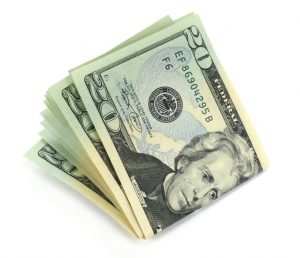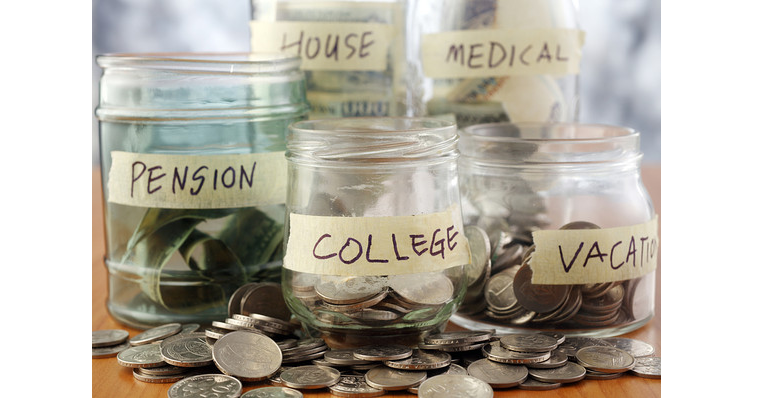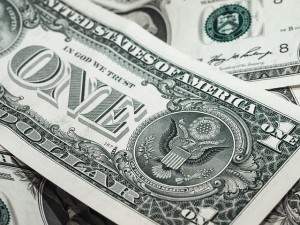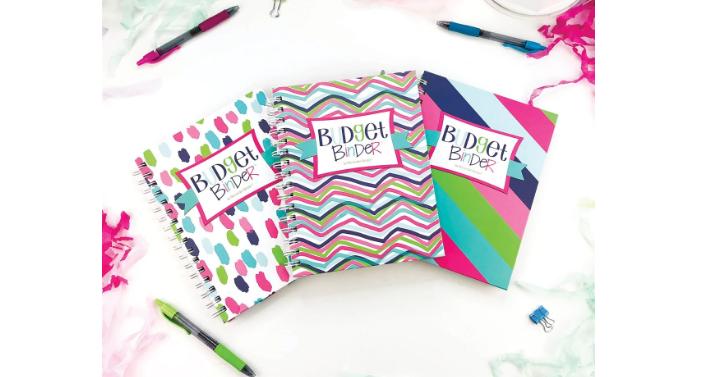Budgeting Made Easy 12-Month Planner – Only $34.97!
It’s never too late to get your finances in order! And having a fun planner makes this sometimes burdensome task a lot more manageable! Right now, Jane has this Budgeting Made Easy 12-Month Planner for only $34.97! Choose from seven design options, all currently available! This Budget Binder Financial Planner is an excellent guidebook to foster good money habits. It serves as a consistent reminder to be mindful of spending/saving every day, week & month. Using this binder and completing the worksheets, over time you will not only learn valuable life skills but you’ll also build a strong credit score, too!
*Shipping is FREE with your purchase!
Budget Planner just $10.99
2023 is going to be the year you get your budget under control! Get started with this awesome budget planner! It’s just $10.99 right now at Amazon.
This item will ship free for all Amazon Prime members. Or, regular members can score free shipping by adding $35 or more worth of eligible items to your cart. You can get a 30-day free trial of Amazon Prime here.
Crush Your Bills Budgeting Kit – Only $19.97!
It’s never too late to start budgeting! Right now, Jane has this Crush Your Bills Budgeting Kit for only $19.97! (Reg. $49.97) Choose from seven beautiful design options! This Budget Binder is your comprehensive (but ever-so-fun) workbook to track income, expenses, debt & savings. In addition to these main pillars, you’ll get a suite of useful tools to build your monthly budgets, check off bills, organize (& remember) passwords, manage account standings & more!
*Shipping is FREE with your purchase!
Money Management Must-Have Kit – Only $19.97!
No better time to get those finances in order than in the beginning of the year! Head over to Jane where you can get this Money Management Must-Have Kit for only $19.97! (Reg. $49.97) Choose from seven fun and unique designs, all currently available! You can’t map out your future if you don’t know where you are. This guidebook will help you compile all your necessary info in one place! Grab one today!
*Shipping is FREE with your purchase!
Money Management Must-Have Kit – Only $19.97!
Budgeting is never fun, but having a cute binder set can definitely help! Right now, Jane has this Money Management Must-Have Kit for only $19.97! (Reg. $49.97) Choose from seven different design options. This Budget Binder is your comprehensive (but ever-so-fun) workbook to track income, expenses, debt & savings. In addition to these main pillars, you’ll get a suite of useful tools to build your monthly budgets, check off bills, organize (& remember) passwords, manage account standings & more! This could be a great Christmas gift for other moms, teens, or college-aged kids!
*Shipping is FREE with your purchase!
Budget Binder Bill, Income/Expense Tracker – Only $19.95!
Get on top of managing those finances with this deal! Head over to Jane where you can get this Budget Binder Bill, Income/Expense Tracker for only $19.95! (Reg. $34.95) Choose from three super fun and awesome design options still available. Here are some additional details:
- New 12-Months of Financial Management
- Monthly Budget Builder Spreads
- Pockets | Tabs | 354 Stickers
- Track Income, Expenses, Debt, &Savings
*Shipping adds $3.99 for the first item and $1.99 for each additional item
The Baby Steps Explained

Are you working on your own debt free journey? Are you doing your best to make your past bad financial decisions go away? You have likely heard about Dave Ramsey and his “baby steps.” I am not affiliated with Dave Ramsey, but I am a fan of is and have been working on putting his principles to use with my own finances.
If you are curious enough to look into it, here is a short explanation of the baby steps that his followers live by and why they may (or may not) work for you:
- Step 0: Take care of your four walls. This means to bring your rent or mortgage current along with your utility bills. This means power, water, sewer, etc. This is not your cable and credit cards.
- Step 1: Build up an emergency fund of $1,000.
- Step 2: Pay off all of your debt excluding your home.
- Step 3: Build up a fully funded emergency fund (typically three to six months of expenses).
- Step 4: Invest 15% of your income into retirement plans.
- Step 5: Work on building a college fund for your children.
- Step 6: Time to Pay off your house!
- Step 7: Build wealth and give.
Breaking these steps down in this form is a great way to minimize how overwhelmed you can become by the entire process. It is easier to focus on one thing at a time, making your success more likely.
Do any of you follow Dave Ramsey’s plan? I would love to hear about any of you who have found success utilizing his budgeting tips and programs. Or, have you found a different direction that has proven successful for you?
Debt payoff is not a one-size-fits-all situation. What works great for one person is likely not going to work exactly the same for someone else. This is why I love hearing about everyone’s experiences in their budgeting, saving, investing and debt payoff journeys.
Are you broke?

Are you broke? No, really, it is a legitimate question. If you are living paycheck to paycheck you are definitely broke and you should make a significant effort to turn your financial situation around. Most people though, don’t necessarily feel like they are broke and it might take a little bit of convincing them that they actually need to make some changes.
So, you may have to ask yourself some questions to determine if you are in fact, broke:
- Are you living paycheck to paycheck? Yep, you are broke.
- Are your credit cards maxed out? Yep, broke.
- Do you have any balance on your credit card? Broke.
- Do you struggle to pay your bills each month, even though you make good money? Broke.
- Is your house payment more than 25% of your monthly income? Most likely broke (This one is not a guarantee, but you should always strive to keep your house payment at a lower threshold than 25%.
- Are you paying late fees each month. Definitely broke.
- Do you avoid checking your bank balances afraid of what you may see? You are most likely beyond broke.
Most of us have had some broke times throughout our lives. There is no shame in that. There is, however, ways of beating this broke cycle and getting yourself set on the straight and narrow in the fiscally responsible world.
How? You ask. Well, here are just a couple of tips on how to stop being broke:
- Get a second job. Oftentimes it’s a spending problem as opposed to an income problem, but it may be a good idea to start bringing in some more money to pay down your debts.
- Stop charging stuff. Seriously. Be disciplined in your spending and DO NOT use your credit cards.
- Budget, budget, budget. I say it all the time, but that’s because it WORKS!! Budget each and every month and you will be amazed at how much better your financial life will be.
5 Questions You Should Ask Yourself Before Every Big Purchase

Are you trying to change your financial outlook? Are you looking to make a difference in your family’s financial health? It’s a big deal though, making changes like this. We work and work all year long and sometimes it seems like we have not much time left over at the end of the work week with very little money at the end of it. So how can we reverse it? How can we switch up our financial life so we are always chasing the almighty dollar? Well the simple answer is that we change our habits. We need to make different choices in order to make a true difference. One of the ways in which we need to change is by changing how we make purchases.
Are you considering making a big purchase in the near future? This is something that definitely needs to be considered before you do it and here are 5 questions you should ask yourself before every big purchase:
- Is this a want or a need? This is not to say that you shouldn’t spend money on wants, but if your budget is low, you need to reconsider how much you are spending and why you are spending.
- Can you afford two of them? This may seem silly since you only want one of them, but the truth is, if you absolutely can’t afford two of them, than 1 is more than likely going to tax your budget.
- Can you pay for it with cash? There are very few things that you should ever purchase on credit. If you are looking to buy something that you can’t afford to pay cash for, you probably shouldn’t buy it.
- Can you buy it used? There is a great market out there for used items. Can your purchase be made used? You can likely save a large amount of money if you are able to buy it second-hand.
- Is it worth the amount of work you need to do for it? Let’s say that you make $20 per hour and you are looking at spending $100 on something. Is this item genuinely worth spending 5 hours at work for? This is one of my favorite questions. It has kept me from quite a few frivolous purchases.
6 of the Biggest Budget Problem Areas

Are you trying to figure out where the heck all of your money goes? Trust me, I’ve been there. Trying to understand how I got paid one week and it seemed like I was broke a week later. I could have $100 in my hand at the beginning of the day and end the day with like $3 easily and wondering “how did that happen?” The thing is though, many times our money disappears quickly because of some common budget problem areas.
Here are 6 of the biggest budget problem areas, so you know where you can start cutting back:
- Fast Food. Seriously. Just stop going, it may seem like no big deal if it’s just a couple bucks for food, but it adds up quickly and in a months’ time, you can easily spend hundreds each month on this alone.
- Coffee. Make a drive through the coffee shop a once-in-a-while splurge instead of a daily habit. One $5 latte every weekday adds up to $100 or more monthly. Where else could you use this $100?
- Cable. Do you really need cable? The answer is probably no. Even if you keep the cord, do you really need the fancy, expensive cable package? I was recently speaking to a friend who pays over $250 each month for this service. Wow. No thank you.
- Food waste. How much food do you throw away each month? My guess would be too much. Start serving leftovers for lunch each day.
- Late fees. So, you want to “save money” by waiting until next week to pay your bill, huh? We that’ll cost ya. Most places charge you an extra $5-$20 each month for late fees.
- Cell phones. How much do you pay for your phone each month? Many people do not bat an eye at the idea of making a payment of $25-$50 for their phone alone, that doesn’t even include your service.
5 Things That People Forget to Budget For

Twenty dollar bills isolated against white background.
Many of us do our best to budget for our day to day expenses. Budgeting can make life so much easier, but it can be difficult to get started. Putting limits on yourself is rough when you are used to spending willy-nilly. But again, life can feel much better when you don’t have yourself extended out as far as your finances go. Some everyday expenses though, are easy to forget about. Make sure you put these 5 things into your budget to ensure you stay on track:
- Vehicle Maintenance. Your vehicle needs to be maintained and that costs money. This includes oil changes every 3000 to 5000 miles as well as tires, and other parts that need to be maintained such as brakes. In addition, be sure that you budget in expenses for licensing your vehicle. Each state has it’s own rules and costs as far as vehicle registration goes so be sure you know what to expect when that time comes.
- Insurance. Insurance is sometimes easy to overlook, especially when the payments aren’t made monthly.
- Medical costs. People often overlook the costs of medical treatments and medications (outside of what insurance pays). Be sure to include copays and deductibles into your budget when you are creating it.
- Memberships. If you have any kind of memberships, you need to write them all down, when you pay and how often. When you have memberships, especially lower cost ones, it is easy to forget about. These memberships can include things like Amazon, Netflix, gym, etc.
- Gifts for friends/extended family. If you buy birthday and Christmas gifts for friends and extended family, be sure to include the costs of these gifts into your budget when you create it. I typically put a limit on how much I will spend on such gifts ($10-$20) and add them in at that rate. These gifts can add up throughout the year.
When to Talk to Kids About Money

Are you wanting to teach your children about money? Do you feel lost when it comes to knowing the right time to do it? The beauty of this is that there are many many “right time” moments and if you jump on the chance to teach them as often as possible, your kids will have a better shot at knowing what to do about money as they get older.
Here are the times when you should talk to kids about money:
When you pay your bills. When you sit down to pay your bills each month, you should have your kids sit down and talk to them about it. For example, if you get your power bill, you can spend the time explaining to your children what causes the bill to grow and what you can do to keep the cost down. You can also explain how much of your workday will be spent working to pay the single bill.
When you set your budget. This kind of goes along with paying your bills each month, but when you are setting your budget each month, having your kids sit in with you is a great idea so that they can see that a budget is needed in order for your finances to function properly.
When you swipe your debit card. Make sure that you kids understand that a debit card is the same as cash in that whenever it gets swiped, the money in your account decreases. It’s not as invisible as it seems.
Allowance. Giving your kids an allowance is a great way to get them used to creating their own budget and having control over some finances before they are thrown into it as adults. Let them work for money and letting them control how it is saved or spent is a good way to get them focused on making the right choices.
Prepare Your Budget And Take Control of Your Finances This Year!

Want to take control of your finances? Maybe this is one of your New Year resolutions. No matter if it is or not you need to start with a good budget. So here are some things you can do and think about when you’re preparing your budget this year.
List out your debts and bills. We did this by looking through our last month’s statements. I made a list (in excel) with the due date, what the expense is and the minimum payment. This gave us an idea of exactly what bills had to be paid and when.
Cut down your expenses. Now that you know what bills you have, are there any you can cut out? What about the cable? Cell phone bill? Look through your bills and try to reduce as much as you can. This will help you save more if you’re in debt and trying to get out.
Figure out the best way to record your income and spending. We needed to go simple with this because honestly this one is difficult for me if I start to make it too complicated. So I pulled up excel and created a chart I could use. Now you can do this but there are also great programs out there you could use as well. So do a little research and find the one that best fits your needs.
Create your budget. You want your budget to be realistic and now that you know what your bills are it’s easier to see what’s left and what you can afford to spend on things like food, gas and household items. This is where you also need to think about your savings plans (long term and short term).
Speaking of savings, start an emergency savings. Mine is set up at a completely different bank and we only use it for emergencies (like the water heater that went out last year). Dave Ramsey (financial guru) recommends saving $1000 in this account which we found to be a great amount.
Remember your yearly expenses. When you’re going over your budget you need to remember your yearly expenses. That’s things like car registrations, Christmas/Birthday money, etc. You don’t want to find yourself set back and with nothing when that time of year comes.
I hope this helps you guys get started with your budget. Don’t be afraid of it, I know once you have it all set up it will go smoothly and you’ll be on the right path and taking control of your finances! And remember, you’ll probably need to look back over your budget and tweak a few things here and there – that’s ok!
5 Great Budgeting Tips

Do you have a household budget set up? Many people are overwhelmed by the thought of setting up a budget, but you don’t have to. Budgets can be the difference between succeeding and not and with a couple of simple tips, you can make budgeting a simple tool that can greatly improve your life.
Set a Monthly Budget Date
Be sure to work on your budget at least once a month. If you set a date on the same time each month (example, the 1st of the month) to set your budget and expenses up and be sure to follow through each month at the same time to be sure and keep it up to prevent falling behind on your budget.
Do it Together
Sit down with your significant other and go through your budget together. Making this a project together is a great way to open up the lines of communication. Both of you being on the same page as far as your income and expenses will save a tremendous amount of stress. It will also prevent one of you from spending more than you have because you simply didn’t know what is left in the account and what still needs to be paid, etc.
Don’t Leave Anything Out
Make sure that you incorporate all of your income and expenses into your budget. Be sure to include all of your bills and don’t forget to include your other expenses like gas, groceries, clothing, etc.
Use Your Phone
If you have a smartphone or tablet, be sure to download one of several free budgeting apps that practically run your budget for you. All that you need to do is input your information boila…it keeps a running total at the touch of your hands.
Allow some Wiggle Room
A budget is important, but it is also important to work in a little bit of wiggle room in your budget for entertainment. Even if it is just $20 for the month. This will help prevent you from feeling too fenced in by your budget.
What are your favorite budgeting tips? Do you have any tools that have helped you in your budgeting journey?
How to Prevent Blowing Your Budget Each Month

Do you find yourself spending all of your money as soon as you get it? With bills needing to be paid and supplies needing to be bought, setting a plan is imperative to keep yourself away from financial disaster.
Have you went over your budget before? Have you figured out a way to prevent it from happening again? There are some clever ways that you can actually keep yourself from blowing your budget each month and creating more financial security in your life. Just be sure that you are ready to follow through.
Think before you spend. This is the single most important thing you can do. Of course, you need to pay your bills, but what about those impulse purchases? Before you head out to dinner or buy those cute boots, really think about whether or not, your budget allows it.
Shop sales. When you are buying groceries or household supplies, use coupons and shop sales. Shopping this way can help you to save up to 40% on your grocery costs. Considering that groceries are typically one of the biggest household expenses, this can equal a lot of money saved.
Set a Budget. Set up a budget for your household finances. Include any and all bills that must be paid and expenses that are required. Also be sure to set aside an amount for savings and make sure to allow an amount for “fun money” and entertainment. Even if it is just $20 per month, it will help you to not feel restricted by your budget.
Set Goals and Plan Rewards. Be sure and set goals to go with your budget and don’t be afraid to reward yourself when you reach those goals. Changing your spending habits is a hard thing and it deserves to be rewarded.
When you live paycheck to paycheck and run out of money each month, it is stressful. Freeing yourself from the paycheck to paycheck lifestyle is one of the best things that you can do for your life and your health. I know that setting a budget is intimidating, but I know that you can do it!
- 1
- 2






